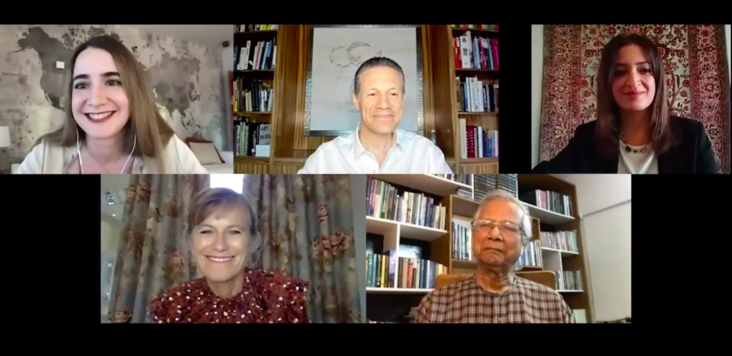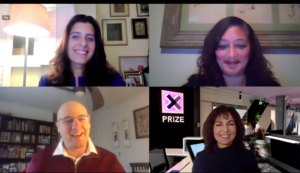Investing In Impact Enterprises A Solid Business Model For Our Times, Experts Opine At SEF 2020 Inaugural Discussions

The fourth edition of the fully virtual Sharjah Entrepreneurship Festival (SEF) organised by the Sharjah Entrepreneurship Center (Sheraa) opened on December 6, Sunday,with two powerful discussions, which have impressed upon the need for investing in the next generation of impact entrepreneurs.
Everyone can be a changemaker
Titled ‘The Butterfly Effect: How Everyone can be a Changemaker’, the first discussion of the day saw the participation of a distinguished panel featuring Muhammad Yunus, Nobel Peace Laureate 2006 and Founder, Grameen Bank; Jacqueline Novogratz, Founder and CEO, Acumen; Badr Jafar, CEO, Crescent Enterprises and President, Crescent Petroleum; and Muna Al Gurg, Director of Retail, Easa Saleh Al Gurg Group.
Moderated by Medea Nocentini, Co-Founder, Companies Creating Change (C3), the session explored how new challenges can give birth to ideas that, if pursued with determination, can spur creative solutions that can be the source of positive change.
Professor Yunus advised impact entrepreneurs not to depend entirely on external help and support in establishing their businesses, noting that public and private entities should work to remove the roadblocks that limit impact enterprises and social businesses from achieving their goals. He backed his message with his personal living example of entrepreneurial success with Grameen Bank, which has empowered its journey on its own, managing to service loans for 140,000 women over the past 11 years.
He had a message for youth: “Do not listen to anybody who says it cannot be done. Be yourself, think of what you want, find the purpose of your life. You are the most powerful generation of youth we have ever had, with technology and knowledge at your fingertips that can be used to undo a lot of the damage that we have been inflicting on ourselves over the years. Use that power, become that power.”
Jacqueline Novogratz spoke about the ‘Butterfly Effect’ in her life, describing how she quit her job on Wall Street in 1986 to co-found Duterimbere, Rwanda’s first microfinance institution. The experience is described in her bestseller, The Blue Sweater: Bridging the Gap between Rich and Poor. She founded Acumen in 2001 to mobilise impact investments. Acumen has so far invested $128 million in more than 128 social enterprises across Africa, Latin America, South Asia, and the United States that have brought basic services like affordable education, healthcare, clean water, energy and sanitation to more than 260 million people.
“While investing in impact enterprises, investors should take a long-term approach. They must understand that they are investing in the future and not start dictating as an investor. At this moment in history when there is great convergence, they should realise that everybody should be a part of the solution.”
Badr Jafar said impact entrepreneurs should properly understand the nature of the problems they are trying to address before setting off on a heroic quest to solve them.
“The idea should not be to create a Silicon Valley here,” he said. “We need a platform that is tailored to our own needs and is focused on solving the most important social and economic challenges facing the region. That is why I advocate the creation of a new breed of humancentric innovation hubs designed to support entrepreneurs looking to harness the power of technology and business innovation to inclusively serve humanity and our habitat.”
On the role of the government and private sector in bringing innovation to the sector, Jafar said: “We all have to cooperate, we do not stand a chance otherwise. I believe nobody gets there unless everybody gets there, and this applies to our joint quest to embrace the knowledge economy as our destiny.”
Muna Al Gurg said impact entrepreneurship solved problems through innovation keeping in mind the triple bottom-line of ‘people, planet and profit’. “Millennials and Gen Xers are looking beyond profit and seeking to make a difference in their community by impacting the issues they care about. Many challenges have been addressed by them, and so much more can be done.”
Speaking about the government’s role in facilitating such enterprises, Al Gurg said: “In UAE, the government has assumed an admirable role in setting an example on what can be achieved. Through the Emirates Foundation, we have a much greater reach than any private sector initiative to the largest youth volunteer platform at the national level. The private sector in our region has to step up and do much more to make a difference.”
Conscious Capital: Investing in the Next Generation of Changemakers
The stellar line-up for the second panel of the day included Anousheh Ansari, CEO, Xprize, and first female private space explorer; Dimple Sahni, Managing Director, Impact Funds Portfolios – Anthos Fund and Asset Management; and Ned Tozun, CEO and Founder of d.light. Sonia Weymuller, Founding Partner, VentureSouq, moderated the session.
Speaking about the popular perception that socially driven companies do not promise financial returns, Anousheh Ansari said that while Xprize Foundation attracted a multitude of impact funds, investors expected immediate profits. “I feel impact investing should be called ‘patience capital’! It is not that such businesses cannot be profitable, but that cannot be your primary motive. This mismatch of expectations has to be resolved.”
She added: “The manner in which we value and manage risk has to change. If we can assign a financial value to the risk that would entail if we were not to have a solution for the said problem, then investors will truly understand what impact investment is. It is investing in the future of humanity – helping someone fix the problem that you cannot fix. That is what should be a part of our mission, to help people see that by funding these enterprises, the risks that led to pandemics, job losses and such, can be negated.”
Dimple Sahni felt that social enterprises were coming of age. “There is a need for all kinds of capital in impact enterprises. The stigma on social entrepreneurship and impact investment is changing by the day and it will take just a couple of companies to make blockbuster exits to really open up the perception that investors can have great returns on impact enterprises. As the markets get more efficient, you will see more commercially oriented social impact funds emerging. It may feel good to be doing good for the world, but the fact is it is also a very solid business model for our times.”
Investors should be cognizant that impact enterprises succeed in the long-term, said Ned Tozun. “They should believe in the mission of the enterprise, not just the returns. We met our founding goal of impacting 100 million lives by 2020 through our solar products and it is extremely gratifying as it shows the potential for social entrepreneurs to make a real difference in the lives of people in developing countries on a massive scale. d.light has demonstrated that business models that are inclusive and improve people’s lives are also scalable and competitive.”
Over the next four days, SEF 2020, powered by Sahab Smart Solutions and held under the strategic partnership of Sultan Bin Al Owais Real Estate and supported by Sharjah FDI Office (Invest in Sharjah), will feature an internationally-renowned line-up of more than 50 speakers who will address a global audience of young changemakers, ecosystem leaders, and entrepreneurs through a packed programme of knowledge-sharing panel discussions, interactive workshops, and inspiring keynote sessions.
To be a part of the region’s largest festival celebrating entrepreneurs, and to stay updated on the festival agenda, interested participants can follow SEF 2020 on Facebook, Instagram, Twitter and LinkedIn @SharjahEF, or visit the website, www.sharjahef.com.


